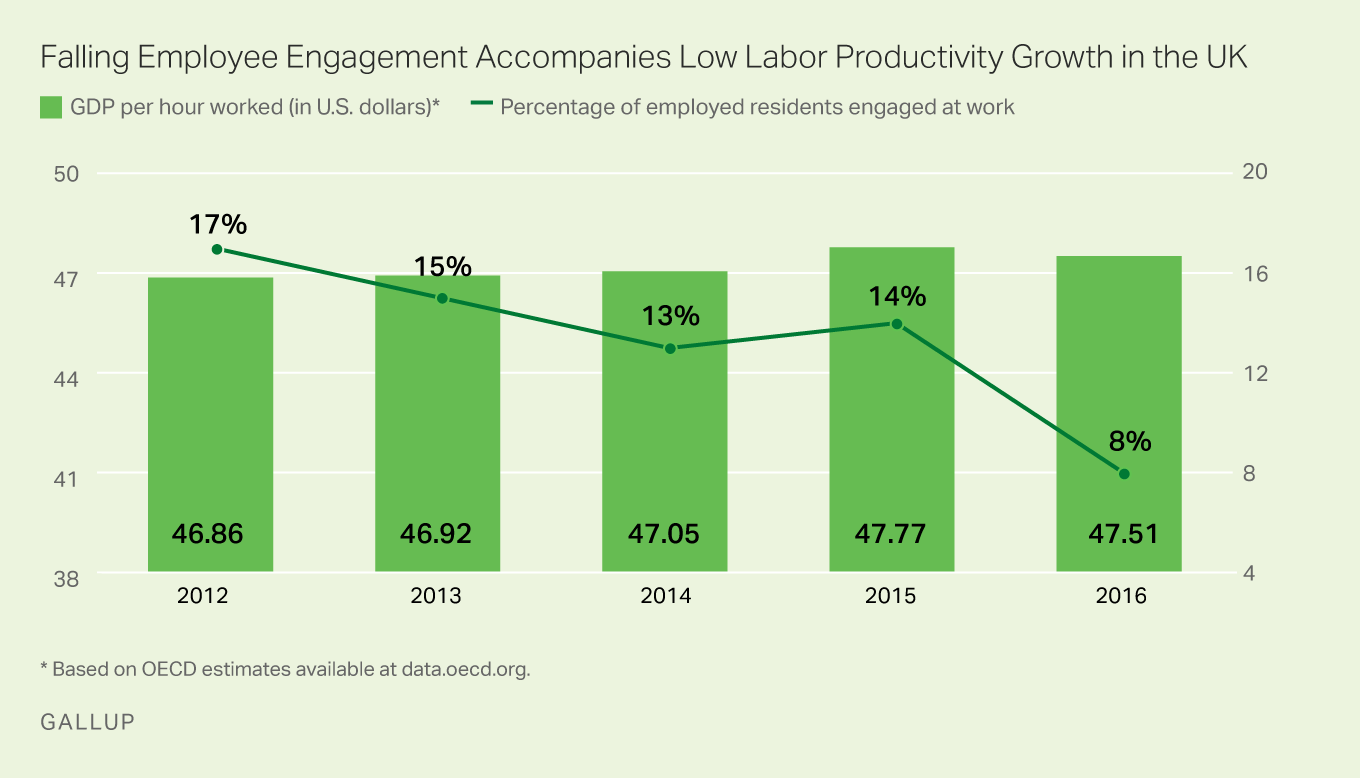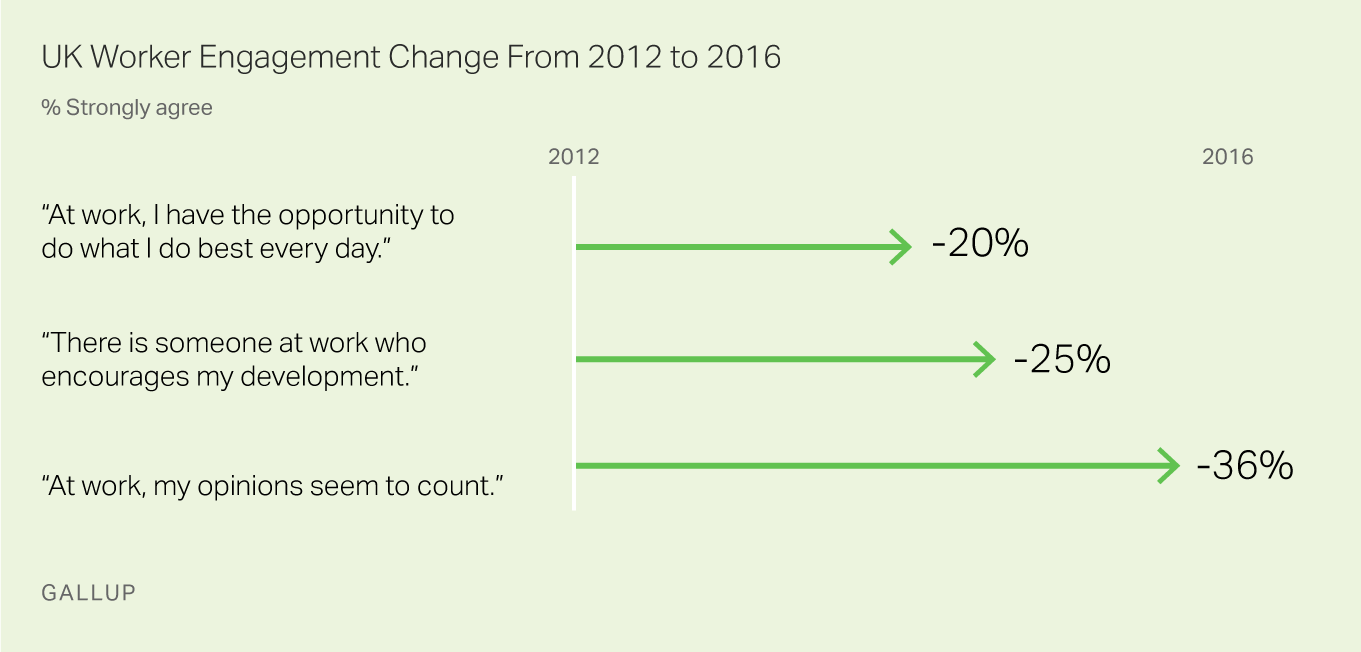In the U.K., growth in labor productivity has yet to regain its healthy pace from before the global recession. Speaking this past March, the Bank of England's Chief Economist Andy Haldane cited lack of management quality as a possible reason for the U.K.'s "long tail of [unproductive] companies."
Gallup data support the idea that not only is much of the British labor force poorly managed, but also that the problem is getting worse. Since 2012, Gallup has tracked a set of workplace metrics among employed Britons -- including employee engagement, which is an index of workplace perceptions that are consistently predictive of positive business outcomes. The most recent data, gathered in 2016, indicate just 8% of employed Britons are engaged at work, down from 17% in 2012.

In other words, about one in 12 British employees are highly involved in and enthusiastic about their work and workplaces. These employees psychologically "own" their work, helping move their organizations forward by driving performance and innovation. The bulk of employees in the U.K. -- 73% -- are classified as "not engaged," meaning they are psychologically unattached and putting little energy or passion into their work. The remaining 19% are "actively disengaged," resentful that their workplace needs aren't being met and likely to be acting out their unhappiness on the job.
At 33%, U.S. employees studied in 2016 were four times as likely as British employees to be engaged at work. Though employee engagement results are uniformly worse in Europe than the U.S., in only a few countries are workers as unlikely to be engaged as they are in the U.K. Moreover, rates of GDP per hour worked were significantly higher in the U.S., Norway, Denmark, Sweden and Germany than in the U.K.
| Engaged employees | |||||||||||||||||||||||||||||||||||||||||||||||||||||||||||||||||||||||||||||||||||||||||||||||||||
|---|---|---|---|---|---|---|---|---|---|---|---|---|---|---|---|---|---|---|---|---|---|---|---|---|---|---|---|---|---|---|---|---|---|---|---|---|---|---|---|---|---|---|---|---|---|---|---|---|---|---|---|---|---|---|---|---|---|---|---|---|---|---|---|---|---|---|---|---|---|---|---|---|---|---|---|---|---|---|---|---|---|---|---|---|---|---|---|---|---|---|---|---|---|---|---|---|---|---|---|
| % | |||||||||||||||||||||||||||||||||||||||||||||||||||||||||||||||||||||||||||||||||||||||||||||||||||
| U.S. | 33 | ||||||||||||||||||||||||||||||||||||||||||||||||||||||||||||||||||||||||||||||||||||||||||||||||||
| Denmark | 17 | ||||||||||||||||||||||||||||||||||||||||||||||||||||||||||||||||||||||||||||||||||||||||||||||||||
| Norway | 17 | ||||||||||||||||||||||||||||||||||||||||||||||||||||||||||||||||||||||||||||||||||||||||||||||||||
| Sweden | 15 | ||||||||||||||||||||||||||||||||||||||||||||||||||||||||||||||||||||||||||||||||||||||||||||||||||
| Germany | 13 | ||||||||||||||||||||||||||||||||||||||||||||||||||||||||||||||||||||||||||||||||||||||||||||||||||
| Finland | 13 | ||||||||||||||||||||||||||||||||||||||||||||||||||||||||||||||||||||||||||||||||||||||||||||||||||
| Netherlands | 12 | ||||||||||||||||||||||||||||||||||||||||||||||||||||||||||||||||||||||||||||||||||||||||||||||||||
| Belgium | 10 | ||||||||||||||||||||||||||||||||||||||||||||||||||||||||||||||||||||||||||||||||||||||||||||||||||
| U.K. | 8 | ||||||||||||||||||||||||||||||||||||||||||||||||||||||||||||||||||||||||||||||||||||||||||||||||||
| Spain | 6 | ||||||||||||||||||||||||||||||||||||||||||||||||||||||||||||||||||||||||||||||||||||||||||||||||||
| Italy | 4 | ||||||||||||||||||||||||||||||||||||||||||||||||||||||||||||||||||||||||||||||||||||||||||||||||||
| France | 3 | ||||||||||||||||||||||||||||||||||||||||||||||||||||||||||||||||||||||||||||||||||||||||||||||||||
| Gallup | |||||||||||||||||||||||||||||||||||||||||||||||||||||||||||||||||||||||||||||||||||||||||||||||||||
There's little doubt that the lack of intrinsic motivation signaled by low engagement scores affects labor productivity. Gallup researchers regularly conduct a "meta-analysis" of recent workplace studies to estimate the relationship between employee engagement and other conventional indicators of business health. The 2016 meta-analysis, which included more than 82,000 business units in 73 countries across 49 industries, found that units in the top one-fourth of engagement scores were 17% more productive and 21% more profitable than those in the bottom one-fourth.
British Companies Must Recast Their Managers to Meet Changing Employee Expectations
Engaged employees help produce favorable business outcomes in many ways, including though higher retention rates, lower absenteeism and more positive relationships with customers and coworkers. They are more productive largely because they feel valued and well-supported by their organizations -- particularly by their immediate managers -- and their work aligns with their natural abilities and personal developmental goals.

Create Exceptional Workers
Strengthen employee performance with a culture of engagement.
However, British workplaces appear to be headed in the wrong direction with regard to these key attributes. For example, employees surveyed in 2016 were 20% less likely than those surveyed in 2012 to strongly agree that they have the opportunity to do what they do best at work, and 25% less likely to strongly agree there is someone at work who encourages their development.
Most alarmingly, British employees are now 36% less likely than they were in 2012 to strongly agree that their opinions count at work. That suggests workers in the U.K. are less likely to voice ideas for improving efficiency within their roles or teams at a time when such improvements are a badly needed source of potential productivity gains.

It's difficult to pinpoint the precise reasons British employees' discontent with their workplaces is growing, but one conclusion seems clear: many of the country's employers need to consider the extent to which bad managers are hindering their workforces' performance. Part of the problem is that the talent for effectively managing people is not sufficiently valued in the U.K., so employees are often placed in management positions without the skills they need to succeed in those roles. According to one recent estimate, Britain has about 2.4 million such "accidental" managers.
In that light, it's little wonder that managers in the U.K. are still often thought of as hapless administrators a la The Office's David Brent, rather than as the gifted coaches that truly effective modern managers must be. Gallup's research clearly demonstrates that traditional approaches to people management -- characterized by hierarchical employee-manager relationships and annual performance reviews -- no longer motivate employees. Younger workers in particular place a heavy premium on jobs that provide them with developmental opportunities, and managers who help them make the most of those opportunities.
Thus, to some extent, worsening workplace perceptions in the U.K. may represent a not-so-gradual shift in employees' expectations, and the difficulty the nation's employers are having in adapting managerial roles and hiring criteria accordingly. British businesses can meet this challenge by mindfully shifting from an increasingly outdated performance management mentality to one that prioritizes employee development. Managers can be transformed into coaches by following a set of core principles for interactions with employees, including:
-
Establishing expectations that are clear, collaborative and aligned. To achieve outstanding performance, employees must first be clear about the work they need to do and what qualifies it as successful. However, good managers not only set clear expectations, but give employees a voice in the goal-setting process and help employees understand how their individual expectations align with the organization's overall goals.
-
Continually coaching employees. The traditional employee feedback process places a great deal of emphasis on a single annual review. But performance is not an episodic event -- it happens every day. Continual coaching helps managers and employees create an ongoing conversation about performance expectations and individualized developmental needs. Great managers ensure these conversations are purposeful and personalized, without leaving employees feeling micromanaged.
-
Creating meaningful accountability. In addition to maintaining an ongoing dialogue with employees, managers should complete at least two formal progress reviews with employees per year. To help transform dreaded annual performance evaluations into constructive progress reviews, managers should ensure these reviews celebrate employee achievements, are perceived as fair and accurate, and include discussion of progress toward employees' developmental goals.
The good news is that once British employers make this transition, they will be better equipped to attract top talent and make the most of it. The bad news is that the longer this transition takes, the greater the risk that companies in the U.S. and other advanced economies will be able to convert their more rapid productivity gains into sustainable competitive advantage.
To learn more about improving employee engagement and performance in your organization:
-
Download our research paper "Re-Engineering Performance Management"
-
Watch our on-demand webinar on performance management
-
Inquire about our employee engagement solutions